

Untitled. Incidence of Tetanus and Diphtheria in Relation to Adult Vaccination Schedules. Most Adults Don't Need to Get Routine Boosters for Tetanus, New Research Shows. If you got your full suite of tetanus and diphtheria vaccines as a kid, good news: New research shows you likely don’t have to go back for any more of those injections as an adult.
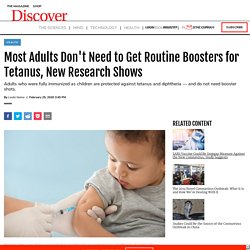
A study comparing 31 nations showed that countries requiring tetanus and diphtheria booster shots had similar disease rates as those that didn’t. The finding, out in the journal Clinical Infectious Diseases, backs up the World Health Organization’s stance that adult boosters of these two vaccines aren’t necessary. The Centers for Disease Control and Prevention recommends that adults get shots for these vaccines every 10 years. Counting those who follow that directive, those adult booster shots cost the U.S. roughly a billion dollars every year — money that could be better spent on other vaccination or health care issues, says Mark Slifka, a co-author on the paper and vaccine researcher at Oregon Health & Science University. Tetanus and diphtheria are bacterial diseases. Comparative Efficacy of Interventions for Aggressive and Agitated Behaviours in Dementia: A Systematic Review and Network Meta-analysis.
Hypothyroidism Over-Treatment Linked to Risk of Atrial Fibrillation. CHICAGO — Low levels of thyroid stimulating hormone (TSH) that result from the over-treatment of hypothyroidism are associated with a significantly increased risk of atrial fibrillation and stroke, according to results from a large, population-based study using data from the Veterans Health Administration.
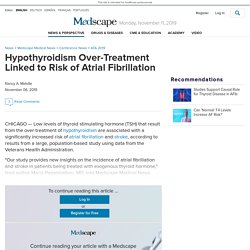
"Our study provides new insights on the incidence of atrial fibrillation and stroke in patients being treated with exogenous thyroid hormone," lead author Maria Papaleontiou, MD, told Medscape Medical News. Treatment included either thyroxine (T4) alone or T4 plus liothyronine (T3) combination, and patients with at least two outpatient TSH measurements were included. Benefits and harms of intensive glycemic control in patients with type 2 diabetes. The MedSafer Study: A Controlled Trial of an Electronic Decision Support Tool for Deprescribing in Acute Care. - PubMed - NCBI. - The Washington Post. Dr. Jim Wright - Is there Evidence for Starting or Continuing Statins in People over 70?
Testosterone Treatment in Adult Men With Age-Related Low Testosterone. Augmentation therapies for treatment-resistant depression: systematic review and meta-analysis. - PubMed - NCBI. Is Medicine Overrated? For years I have ranted about the flaws of medicine, especially when it comes to mental illness and cancer.

But my complaints are mild compared to those of Jacob Stegenga, a philosopher of science at the University of Cambridge. In Medical Nihilism, published by Oxford University Press, Stegenga presents a devastating critique of medicine. Most treatments, he argues, do not work very well, and many do more harm than good. Therefore we should “have little confidence in medical interventions” and resort to them much more sparingly. This is what Stegenga means by medical nihilism. Anticholinergic Drug Exposure and the Risk of Dementia: A Nested Case-Control Study. Key Points Question Is the risk of dementia among persons 55 years or older associated with the use of different types of anticholinergic medication?
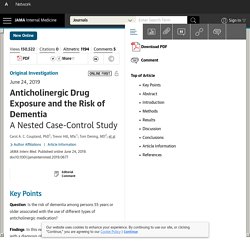
Signs and Symptoms That Rule out Community-Acquired Pneumonia in Outpatient Adults: A Systematic Review and Meta-Analysis. - PubMed - NCBI. REPORT - Medication Overload: How the drive to prescribe is harming older Americans - Lown Institute. The United States is in the grips of an unseen epidemic of harm from the excessive prescribing of medications.
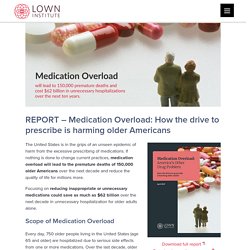
If nothing is done to change current practices, medication overload will lead to the premature deaths of 150,000 older Americans over the next decade and reduce the quality of life for millions more. Focusing on reducing inappropriate or unnecessary medications could save as much as $62 billion over the next decade in unnecessary hospitalization for older adults alone. Scope of Medication Overload Every day, 750 older people living in the United States (age 65 and older) are hospitalized due to serious side effects from one or more medications. Over the last decade, older people sought medical treatment more than 35 million times for adverse drug events, and there were more than 2 million hospital admissions. The prescribing of multiple medications to individual patients (called “polypharmacy” in the scientific literature) has reached epidemic proportions. Lifestyle determinants of behavioural outcomes triggered by direct‐to‐consumer advertising of prescription medicines: a cross‐sectional study - Zadeh - - Australian and New Zealand Journal of Public Health.
Advertising attempts to sell products by encouraging people to buy them.
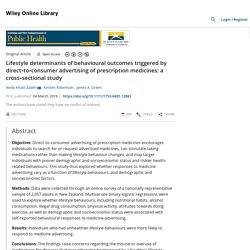
Medicine advertising similarly aims to persuade individuals to search or ask for a medicine.1 Direct‐to‐consumer advertising of prescription medicines (DTCA), a controversial type of advertising, has grown swiftly over the past few decades.2-4 DTCA has only been legally developed in New Zealand and the United States.5, 6 These two countries have different economies and health systems. Adding a Diagnosis to Every Prescription - A Key to Stopping Polypharmacy. Missed opportunities: unnecessary medicine use in patients with lung cancer at the end of life – an international cohort study. Aims The aims of the current study were: (i) to examine the prescribing of preventative medication in a cohort of people with advanced lung cancer on hospital admission and discharge across different healthcare systems; and (ii) to explore the factors that influence preventative medication prescribing at hospital discharge.
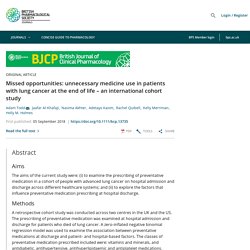
Methods A retrospective cohort study was conducted across two centres in the UK and the US. Rethinking the appraisal and approval of drugs for type 2 diabetes. Huseyin Naci, assistant professor of health policy 1, Richard Lehman, senior research fellow2, Olivier J Wouters, researcher 1, Ben Goldacre, senior clinical research fellow3, John S Yudkin, emeritus professor of medicine4Author affiliationsCorrespondence to: Huseyin Naci h.naci@lse.ac.uk Huseyin Naci and colleagues call for improvements in the regulatory standards for licensing, reimbursing, and adopting new preventive drugs to ensure that treatments for type 2 diabetes really benefit patients The aim of drug regulation is to ensure that only effective and safe treatments reach patients.
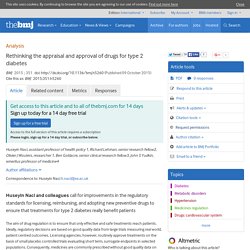
Ideally, regulatory decisions are based on good quality data from large trials measuring real world, patient centred outcomes. Licensing agencies, however, routinely approve treatments on the basis of small placebo controlled trials evaluating short term, surrogate endpoints in selected populations. Box 1: Link between glucose control and diabetic complications. Canadian Pediatric Society says hold off on antibiotics for ear infections.
Seems simple enough: Your child gets an ear infection, you see your doctor and your child gets antibiotics and gets better.

Simple yes, but not typically necessary it turns out. An updated statement by the Canadian Pediatric Society released last week echoes previous recommendations to use a watchful waiting approach before launching into antibiotic use. Why you don't need antibiotics to fight off the flu or colds (CTVNews Video) In practical terms, if your child has a painful ear or a fever he or she may not really need antibiotics or even benefit from them. Antipsychotic Medication for Prevention and Treatment of Delirium in Hospitalized Adults: A Systematic Review and Meta-Analysis. One-third of US adults may unknowingly use medications that can cause depression: Polypharmacy on the rise. Mirtazapine added to SSRIs or SNRIs for treatment resistant depression in primary care: phase III randomised placebo controlled trial (MIR)
David S Kessler, reader1, Stephanie J MacNeill, lecturer2, Deborah Tallon, researcher1, Glyn Lewis, professor3, Tim J Peters, professor1, William Hollingworth, professor1, Jeff Round, senior lecturer1, Alison Burns, researcher1, Carolyn A Chew-Graham, professor4, Ian M Anderson, professor5, Tom Shepherd, researcher4, John Campbell, professor6, Chris M Dickens, professor6, Mary Carter, researcher6, Caroline Jenkinson, researcher6, Una Macleod, professor7, Helen Gibson, researcher7, Simon Davies, professor8, Nicola J Wiles, professor1Author affiliationsCorrespondence to: D S Kessler david.kessler@bristol.ac.ukAccepted 28 September 2018 Abstract Objective To investigate the effectiveness of combining mirtazapine with serotonin-noradrenaline reuptake inhibitor (SNRI) or selective serotonin reuptake inhibitor (SSRI) antidepressants for treatment resistant depression in primary care.

Design Two parallel group multicentre phase III randomised placebo controlled trial. Introduction Methods Results. Elderly And Drugged: Far More Psych Meds Prescribed To Old Than Young. Evidence suggests that anti-anxiety medications like Xanax increase the risk of falls in older adults, which can cause a cascade of problems. (johnofhammond/Flickr, with edits by WBUR) By Nell LakeGuest Contributor Are we over-treating the elderly with psychiatric drugs?
That’s the natural question arising from a recent report that found adults over 65 are receiving psychotropic medications at twice the rate of younger adults. The study, published in this month’s Journal of the American Geriatrics Society, also found that elders are much less likely to get their mental health care from psychiatrists or to receive psychotherapy. What’s the problem? The findings suggest that physicians and insurers should reassess psychotropic drug use among the elderly, says lead author Donovan Maust, a geriatric psychiatrist and assistant professor of psychiatry at the University of Michigan. Maust’s team used 2007-2010 data from the CDC’s National Ambulatory Medical Care Survey and from the U.S. Care homes vary wildly in prescription of antipsychotics, study finds. Wild variations in the number of residents in long-term care who are prescribed antipsychotic medications are focusing new attention on how and why these powerful drugs, which can have serious side effects, are used so routinely.
A study of 604 long-term-care homes in Ontario, to be released Wednesday, found that anywhere from zero to 67 per cent of residents over the age of 65 are treated with antipsychotics after a diagnosis of psychosis, dementia or other conditions that can leave them highly agitated. While the drugs are calming, the side effects include a higher risk of falls, profound drowsiness, lessened quality of life, and a slightly increased risk of death.
There are even complaints that the drugs are used to “chemically restrain” patients in long-term care. Does long term use of psychiatric drugs cause more harm than good? Peter C Gøtzsche, professor, Nordic Cochrane Centre, Rigshospitalet, DK-2100 Copenhagen, Denmark, Allan H Young, professor of mood disorders, Institute of Psychiatry, Psychology and Neurosciences, King’s College London, UK, John Crace, psychiatric patient and parliamentary sketch writer, Guardian, London, UK Correspondence to: P C Gøtzsche pcg@cochrane.dk, A H Young allan.young@kcl.ac.uk We could stop almost all psychotropic drug use without deleterious effect, says Peter C Gøtzsche, questioning trial designs that underplay harms and overplay benefits. Allan H Young and John Crace disagree, arguing that evidence supports long term use.
Z-drugs and risk for falls and fractures in older adults-a systematic review and meta-analysis. - PubMed - NCBI. Unnecessary use of ADHD drugs increases over 60%, study suggests. The study, published Monday in the journal Pediatrics, looked at all calls to US poison control centers for unintentional or intentional exposure to ADHD medications between 2000 and 2014 among children and adolescents. The researchers found that the number of calls increased from 7,018 in 2000 to 11,486 in 2014 -- a 64% increase. According to the study's authors, "exposure" refers to the unnecessary ingestion, inhalation or absorption of these medications. "What we found is that, overall, during that 15 years, there was about a 60% increase in the number of individuals exposed and calls reported to poison control centers regarding these medications," said Dr. Gary Smith, director of the Center for Injury Research and Policy of the Research Institute at Nationwide Children's Hospital and a leading author on the study.
There were three exposure-related deaths. It is unclear why rates of exposure began to decline in 2011, according to Smith. The Harms of Antipsychotic Drugs: Evidence from Key Studies. Do antidepressants work? The following originally appeared on The Upshot (copyright 2018, The New York Times Company). More people in the United States are on antidepressants, as a percentage of the population, than any other country in the world. And yet the drugs’ efficacy has been hotly debated. Some believe that the short-term benefits are much more modest than widely thought, and that harms may outweigh benefits in the long run.
- Cognitive Decline Partnership Centre. Nutritional Support and Outcomes in Malnourished Medical Inpatients: A Systematic Review and Meta-analysis. Multivitamin supplements during pregnancy called needless expense - Health. Most moms-to-be likely don't need prenatal multivitamin supplements, which can be a drain on the wallet, according to a U.K. review. Multivitamin and mineral supplements are often promoted to pregnant women as a way of giving their child the best possible start. Effects of Calcium or Vitamin D on Fractures in Older Adults. Key Points. The term cognition-enhancing medications is misleading. Antidepressant and antipsychotic prescribing in primary care for people with dementia. Association of Thyroid Hormone Therapy With Quality of Life and Thyroid-Related Symptoms in Patients With Subclinical Hypothyroidism.
IVIG: Panacea or pricey placebo? - Hospital News. By Dr. Heartburn Drugs Tied to Kidney Problems. Trends in Prescription Drug Use Among Adults in the United States From 1999-2012. Importance It is important to document patterns of prescription drug use to inform both clinical practice and research. Objective To evaluate trends in prescription drug use among adults living in the United States.
High Cost of Medication Non-Adherence. Drug therapy problems present a serious issue in healthcare in the United States. Industry estimates suggest total costs of unnecessary medical expenditures resulting from medication non-adherence to be approximately $300 billion, which represents more than 30% of the total waste (excluding fraud and abuse) in the healthcare system. Failure to take prescribed medications costs over $100 billion a year in excess hospitalizations.
Intensive Treatment and Severe Hypoglycemia Among Adults With Type 2 Diabetes. Importance Intensive glucose-lowering treatment among patients with non–insulin-requiring type 2 diabetes may increase the risk of hypoglycemia. Effect of Statin Therapy on Mortality in Older Adults Hospitalized with Coronary Artery Disease: A Propensity-Adjusted Analysis - Rothschild - 2016 - Journal of the American Geriatrics Society. Objectives. FDA warning: men’s testosterone drugs overused. Osteoporosis Overtreatment in a Regional Health Care System. Medicines to treat side effects of other medicines? Sometimes less is more beneficial. Lies My Patients Told Me: “I Take My Medications Every Day.” Overuse of Anticoagulation in Treatment of Atrial Fibrillation Patients in University Hospitals of Tehran. The overtreatment of 'mild' hypertension is causing more harm than good, say experts. Overtreatment of Diabetes in Elderly Patients Remains Underrecognized. Study spotlights inappropriate prescribing in urgent care.
Over-medicated seniors are an ‘unseen epidemic’ - CBC News - Latest Canada, World, Entertainment and Business News. Pharmas-co-dependence exposed. New Drugs Are Often Bad For Patients, Great For Pharma. Association Between Academic Medical Center Pharmaceutical Detailing Policies and Physician Prescribing. Association of Proton Pump Inhibitors With Risk of Dementia: A Pharmacoepidemiological Claims Data Analysis. Three ways you can just say no to antibiotic drug abuse.
Levothyroixine overuse: time for an about face? Higher medication doses in heart failure? Doctors prescribing risky drugs to seniors, costing Canada up to $1.8 billion per year: UBC study. Mortality and morbidity in acutely ill adults treated with liberal versus conservative oxygen therapy (IOTA): a systematic review and meta-analysis. - PubMed - NCBI.
Pharmacologic and Nonpharmacologic Treatment for Acute Cough Associated With the Common Cold: CHEST Expert Panel Report. - PubMed - NCBI. Mortality and morbidity in acutely ill adults treated with liberal versus conservative oxygen therapy (IOTA): a systematic review and meta-analysis - The Lancet. Hemodynamic effects of acute hyperoxia: systematic review and meta-analysis. From the Archives – Fever: Friend or Foe? Therapeutics Initiative. Thyroid Hormone Therapy for Older Adults with Subclinical Hypothyroidism. Overtreatment Is Common, Doctors Say - NYTimes.com.